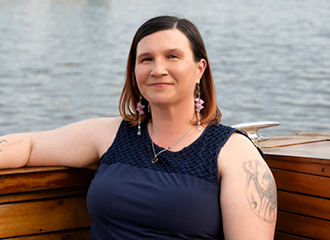Therapy and the Arts Lead Veteran to Sobriety and Purpose
3-minute read
Therapy and the Arts Lead Veteran to Sobriety and Purpose
3-minute read
For Jenny, an Army Veteran, healing from military sexual trauma and PTSD—and overcoming her heroin addiction—has not been a one-woman show.
In addition to getting therapy—including dialectical behavior therapy, cognitive behavioral therapy, and cognitive processing therapy—she got involved in writing workshops and theater for social change to help her find new motivation and rebuild her life. “I just kept trying all things,” Jenny says. “I was like, ‘OK, there’s an answer out there.’”
Jenny’s healing journey has also been tightly connected with helping other Veterans heal.

“We don’t have to just survive.” Veteran Urges Seeking Support for MST
Ideals and trauma
Jenny entered the military in 2003 as a combat medic. Her motivation, she said, was the wish to help and heal. “Then I just ended up on the convoys and shooting at people,” she recalls, “and seeing kids detonate bombs.” Jenny also experienced military sexual trauma while serving.
In the Army, she didn’t feel that she could talk about these traumatic events. Instead, she witnessed, and then adopted, a different way of trying to cope with emotions. “You know, don’t talk about your feelings. Just, you know, drink.”
When she left the Army in 2007, the effects of trauma—and the difficulty communicating about them—lingered.
“I had a really hard time when I came back being around children, ’cause the screaming would trigger me all the time,” she says. But the military sexual trauma had the greatest effect on her mental health.
“The helplessness and the powerlessness is what really changed who I was, till my whole world fell apart after that,” she says. That trauma was compounded by the difference between her experience and the admiring way she heard people talking about the war.
Jenny tried to cope by drinking excessively and misusing heroin. “I was biding my time till I was, like, ready to kill myself,” she says.
Treatment and art
Jenny started mental health treatment in 2007 at the insistence of her parents, but she continued misusing heroin for some time. Then she reached a point where she knew something needed to change. “So there was definitely a moment,” she says, “where I had been up for, like, four days, and I was like, ‘This is not the life I want.’”
Jenny found a way forward by trying additional treatments such as cognitive processing therapy and discovering new passions.
“Each therapy gave me a little bit more information on how to respond instead of react—on how to breathe, on how to feel my feelings in a really safe way,” she says. And the better she started to feel, the more she wanted people to learn what she was learning.
Jenny participated in Veteran artist retreats, theater, and writing workshops and eventually began facilitating the workshops. The creative outlets provided another healthy way to process what she has been through.
Coming full circle
Jenny’s involvement with Veterans’ writing workshops and theater has, in a sense, brought her back to who she was previously—a person who wants to help others to heal and thrive.
She stopped using heroin in 2011 and is continuing her own healing journey. “I had to learn, and I’m still learning now, how to be human,” she says.
Sobriety has also empowered her to help other Veterans. “Sobriety brings me presence,” she says. “Sobriety helps me be able to reframe, and use my skills, and do my breath, and lead the Veterans that I am working with to tell their stories.”
As she facilitates workshops, Jenny grapples with the hard questions that many Veterans face about communicating difficult feelings and experiences. She says, “I had a goal of, like, how can we do this without hurting ourselves?”
But even more, Jenny wants to share that the work of healing is worth it. “I really wanted, especially the women Veterans, to know that they could be empowered, and they could be thriving, and we don’t have to just survive. Happiness is accessible.”
